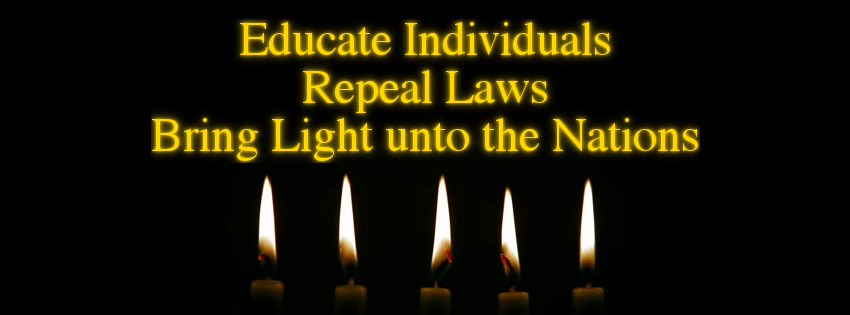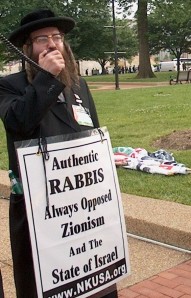There are many definitions of Zionism, some right, some wrong, some partially right, some partially wrong. A good, concise definition is the philosophy that Jews, the Children of Israel should return to the land of Israel, live there, and secure and defend their lives there.
Anti-Zionists on the internet like to wave around groups like the “True Torah Jews” and the “Neturei Karta” as examples of Jewish anti-Zionists. While it is true that the most religious Jewish groups originally were opposed to modern Zionism, it was mainly because semi-secular groups were leading it, and not them. Today, things have changed, and most very religious Jews support modern Zionism to at least some extent. However, opposition still exists, both in Israel and abroad.
The main religious argument against modern Zionism is that only Hashem, via the mashiach (messiah), can return the people of Israel to the land of Israel. This is not based on any scripture, and only weak, if any Talmudic literature. One problem with this philosophy is that it ignores the possibility that Hashem did in fact open the land for us to return to. It does seem to be a bit of a miracle that Jews suddenly gained the mindset to return to Israel en masse. Perhaps Theodor Herzl was the maschiach they were waiting for.
The other argument they like to use is that of the Three Oaths. There are divergent opinions about these oaths. Religious Zionists say that the oaths were fulfilled, or that the third one was broken (Holocaust). They say that Israel did not return en masse, and that they did not rebel against the nations of the world. Religious Anti-Zionists say that the oaths have not been fulfilled. They claim that while it is ok for individuals or families to return, the mass aliyahs between 1880 and 1948 were contrary to the first oath. Additionally, they contend that the State of Israel violated the second oath by taking territory beyond the Partition Plan. Or that the Partition Plan was not even valid because many nations, especially local ones, did not approve of it. Considering that Nasser al-Din, Shah of Persia, Emir Faisal, son of King Hussein the Hashemite of Hejaz, and Sheikh As’ad Shukeiri, deputy and mufti from Acre all negotiated with and agreed to Jewish settlement and self-determination in the Land, this is not an unreasonable argument. Despite this, one can argue that the third oath was not upheld by the nations, and thus they are all abrogated.
ג’ שבועות הללו למה אחת שלא יעלו ישראל בחומה ואחת שהשביע הקדוש ברוך הוא את ישראל שלא ימרדו באומות העולם ואחת שהשביע הקדוש ברוך הוא את אומות העולם שלא ישתעבדו בהן בישראל יותר מדאי.
“Why/What are these Three Oaths? One, that Israel should not storm the wall. Two, the Holy One adjured Israel not to rebel against the nations of the world. Three, the Holy One adjured the nations that they would not oppress Israel too much.”
(Ketubot 110b-111a)
While most Jews follow the Rabbinic denomination of Judaism, there is a small group called Karaites. Simply put, the two groups agree on the divinity of the Tanakh (Hebrew Bible), but not on the divinity of the Talmud. The Rabbinic Jews believe the Talmud is divinely inspired, while the Karaite Jews believe it is a creation of man, often conflicting with the Tanakh. Originally a larger group, the Karaites declined to between 25,000 and 40,000 in the 20th century, and thanks to greater flow of information today, are increasing both in Israel and abroad, especially America. The Karaites have long supported returning to Israel and perhaps were the first post-exile Zionists, centuries before Herzl was even born. The fact that the oldest continuously-used synagogue in Old Jerusalem, built in the 700s and rebuilt in 1187, is Karaite one, is a testament to this medieval Zionist movement.
In the end, only one source can prove whether Judaism is inherently Zionist. That source, of course is the Tanakh itself, and its many themes and stories. The overall theme is quite clear. Abraham was called to live in the land of Israel. Moses was called to return the children of Israel to the Land. Zerubbabel led many Jews back from Babylon after Cyrus, King of Persia, encouraged the return. And Ezra led many more from Babylon as well. The history of the people of Israel is one of leaving the Land, and returning to it.
More specifically, there are very strong and unambiguous commands in the Torah that the people of Israel should return to our Land, and defend ourselves and the Land. Hashem commands us to not slander our own kind, which many Jews secular and religious do by proliferating terrible lies about what Jewish Israelis have done and do. He also commands us not to sit around while our brethren are hurt or killed. Many Jews, often with no religious upbringing, sit around and cry more about those that harm their own family, rather than help their family. However, many more Jews take up arms or pens or keyboards and will not let their people be harmed.
לֹא-תֵלֵךְ רָכִיל בְּעַמֶּיךָ, לֹא תַעֲמֹד עַל-דַּם רֵעֶךָ: אֲנִי, יְהוָה.
You are not to traffic in slander among your kinspeople. You are not to stand by the blood of your neighbor, I am Hashem!
(Leviticus 19:16)
Many years ago, Hashem gave our ancestors land to settle and live securely in. When Moses and Joshua brought the children of Israel to the Land, they were implored to enter and take control of it as promised to their ancestors. While Moses was not permitted to enter, Joshua was, and he led the People across the Jordan and into the Land. He led many miraculous conquests to drive the wicked inhabitants out of the Land, and then set about dividing the Land among the twelve tribes.
רְאֵה נָתַתִּי לִפְנֵיכֶם, אֶת-הָאָרֶץ; בֹּאוּ, וּרְשׁוּ אֶת-הָאָרֶץ, אֲשֶׁר נִשְׁבַּע יְהוָה לַאֲבֹתֵיכֶם לְאַבְרָהָם לְיִצְחָק וּלְיַעֲקֹב לָתֵת לָהֶם, וּלְזַרְעָם אַחֲרֵיהֶם.
See, I give before you the land, enter, take-possession of the land about which Hashem swore to your fathers, to Avraham, to Yitzhak, and to Yaakov, to give to them and to their seed after them.
(Deuteronomy 1:8)
Without a doubt, Zionism, the return to and defense of the Land of Israel is an integral part of Judaism. While many Jews, secular and religious choose to ignore this, or are somehow blind to it, we have succeeded. The restoration in many ways could have been performed better, however, that is only the benefit of hindsight. Those at the time made the best decisions they could with the information they had. We can argue back and forth what they should have done or what the world should have done. But what we cannot argue is that the Jewish people are now secure in their destiny and no longer subject to annihilation, living generation by generation. Provided that we continue to defend it.





Pingback: Questions #1 | Jewish Libertarians